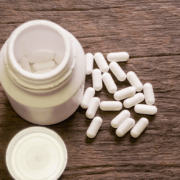Voices, Urgency, and Hope at the National Health Council Annual Meeting
By Sally Greenberg, NCL CEO
Have you heard of Alpha-1 Disorder? I hadn’t either until I had a conversation with the Alpha-1 Disorder team that’s gathered in Ft. Lauderdale for the National Health Council Annual Meeting. I love coming to this gathering because of the energy and drive behind the diverse patient groups and companies working to develop treatments and cures. Lisa Bercu, our Senior Health Policy Director, and I are here talking with and learning from colleagues across the health care spectrum.
Back to Alpha 1 or Alpha-1 Antitrypsin Deficiency (AATD) it’s a genetic condition that can cause damage to the lungs and/or the liver and is often misdiagnosed as COPD. There is no cure for Alpha-1, but symptoms can be managed with treatment. The Foundation is here and exists to advocate for research, more effective treatments and cures, and benefits for patients with Alpha 1.
Tracy Garner from Easter Seals is describing what lies ahead for Medicaid patients whose benefits will be slashed, as called for in HR 1, the so-called “Big Beautiful Bill” that Congress passed in 2025. One in four people in the US identifies as having a disability. One-third of those receive Medicaid benefits. That will have a huge impact on these patients.
Tracy and her team are working with states and their over seventy affiliates to hold meetings with the Centers for Medicare & Medicaid Services and state Medicaid administrators.
Ashlie White’s with the American Orthotic and Prosthetic Association. Her patient base is made up of amputees, and her challenge is ensuring that they get the Medicaid coverage they need, as many of them are on the program. The slashing of Medicaid could be devastating to these patients.
Cheryl Wicks’ group, Mosaic, provides support to 5,000 people with disabilities, mental and behavioral needs, and autism. I asked her what she thought legally about Sheltered Workshops for people with disabilities, where they get to go to work but get paid subminimum wage. NCL has never thought those Sheltered Workshops were a good thing, as they take advantage of people with disabilities, having them work for dirt cheap wages on the theory that at least they are getting out of the house or home. She agreed and used a term I had never heard – Community Integrated Employment, which means people with developmental and intellectual disabilities have jobs like everyone else that pay the legal minimum wage and work out much better. They are at grocery stores or pharmacies, stocking shelves or doing other similar work. Walgreens is particularly outstanding as an employer of people in her community. Hear, hear!
I cannot possibly capture the impact and dedication I feel among these patient advocates and the companies that develop the drugs and cures to treat the conditions described above, and so many more.
























